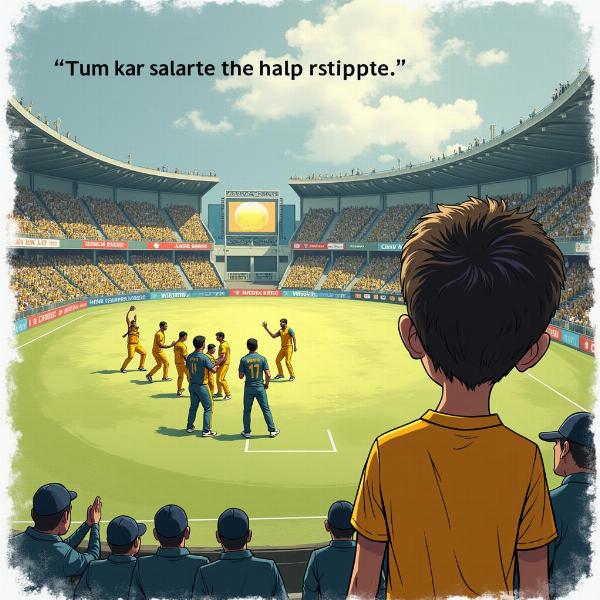Understanding the multifaceted phrase “you could have” in Hindi requires delving into its various potential meanings and the subtle nuances that influence its usage. This seemingly simple phrase can convey a range of implications, from expressing missed opportunities and unrealized potential to suggesting polite suggestions and hypothetical scenarios. Mastering its usage is key to effectively communicating in Hindi.
Decoding “You Could Have” in Hindi: A Multifaceted Exploration
“You could have” doesn’t have a single, direct equivalent in Hindi. Its translation depends heavily on the specific context and the intended meaning. Let’s explore the most common interpretations and their corresponding Hindi translations:
-
Expressing Missed Opportunities: Perhaps the most common usage of “you could have” is to express regret over a missed opportunity. In this context, it often translates to “तुम कर सकते थे” (tum kar sakte the) or “आप कर सकते थे” (aap kar sakte the) – the formal version. For example, “You could have won the race” becomes “तुम रेस जीत सकते थे” (tum race jeet sakte the).
-
Suggesting Alternatives: “You could have” can also be used to suggest alternative courses of action. Here, “तुम … भी कर सकते थे” (tum … bhi kar sakte the) – meaning “you could have also done…” – or “आप … भी कर सकते थे” (aap … bhi kar sakte the) is appropriate. For instance, “You could have taken the bus” translates to “तुम बस से भी जा सकते थे” (tum bus se bhi ja sakte the).
-
Expressing Hypothetical Situations: When discussing hypothetical scenarios, “you could have” often translates to “हो सकता था कि तुम…” (ho sakta tha ki tum…) or “हो सकता था कि आप…” (ho sakta tha ki aap…). This conveys the meaning “it could have been that you…”. For example, “You could have been hurt” becomes “हो सकता था कि तुम चोटिल हो जाते” (ho sakta tha ki tum chotil ho jaate).
-
Polite Suggestions: In some cases, “you could have” can be used to offer a polite suggestion. In these situations, using “शायद आप…” (shayad aap…) meaning “perhaps you…” or “क्या आप…?” (kya aap…?) meaning “could you…?” offers a gentler approach. For instance, “You could have told me earlier” can be politely phrased as “शायद आप मुझे पहले बता सकते थे” (shayad aap mujhe pehle bata sakte the).
 Hindi translation for missed opportunity
Hindi translation for missed opportunity
Navigating Nuances and Contexts
The correct translation of “you could have” depends heavily on the context and the speaker’s intention. Understanding the nuances is crucial for accurate and effective communication.
Formal vs. Informal
Just as English has different levels of formality, Hindi distinguishes between formal and informal address. Using “तुम” (tum) is informal, while “आप” (aap) is respectful and formal. Choosing the correct pronoun is essential for conveying the appropriate level of respect.
Tone and Implication
The tone of “you could have” can range from regretful to accusatory. In Hindi, this can be conveyed through intonation and word choice. Adding words like “भी” (bhi – also) or “तो” (to – then) can subtly alter the meaning and implication of the phrase.
Mastering “You Could Have”: Practical Examples
Let’s look at a few more examples to illustrate the various translations of “you could have” in Hindi:
- “You could have called me.” – तुम मुझे फोन कर सकते थे (tum mujhe phone kar sakte the) – Informal, expressing a missed opportunity.
- “You could have helped me.” – आप मेरी मदद कर सकते थे (aap meri madad kar sakte the) – Formal, expressing a missed opportunity.
- “You could have chosen a different path.” – तुम एक अलग रास्ता चुन सकते थे (tum ek alag rasta chun sakte the) – Informal, suggesting an alternative.
Conclusion: Unlocking the Power of “You Could Have” in Hindi
Mastering the nuances of “you could have” in Hindi opens up a world of expressive possibilities. By understanding the various translations and their contextual applications, you can communicate with greater clarity and precision. Whether you’re expressing regret, offering suggestions, or exploring hypothetical scenarios, the ability to accurately convey the intended meaning of “you could have” is essential for effective communication in Hindi.
FAQ
- What is the most common Hindi translation of “you could have”? The most common translation is “तुम कर सकते थे” (tum kar sakte the) or “आप कर सकते थे” (aap kar sakte the).
- How do I choose the right translation for “you could have”? The correct translation depends on the context and the intended meaning, including whether you are expressing a missed opportunity, a suggestion, or a hypothetical scenario.
- What is the difference between using “tum” and “aap” in Hindi? “तुम” (tum) is informal, while “आप” (aap) is formal and respectful.
- How can I express the different tones of “you could have” in Hindi? Intonation and word choice, including adding words like “भी” (bhi) or “तो” (to), can subtly alter the meaning and tone.
- Where can I find more resources on learning Hindi? Meaning-Hindi.in offers a wealth of resources for learning Hindi.
Meaning-Hindi.in is your one-stop solution for all your Hindi translation needs. We offer a wide range of professional translation services, including business and commercial document translation, certified and legal document translation, technical and user manual translation, website and localization services, educational and academic document translation, express translation, and specialized translation services. Our team of expert translators ensures accurate and culturally sensitive translations for all your requirements. Contact us today for a free quote at [email protected] or call us at +91 11-4502-7584. Meaning-Hindi.in is committed to delivering high-quality translations that bridge language barriers and connect cultures.